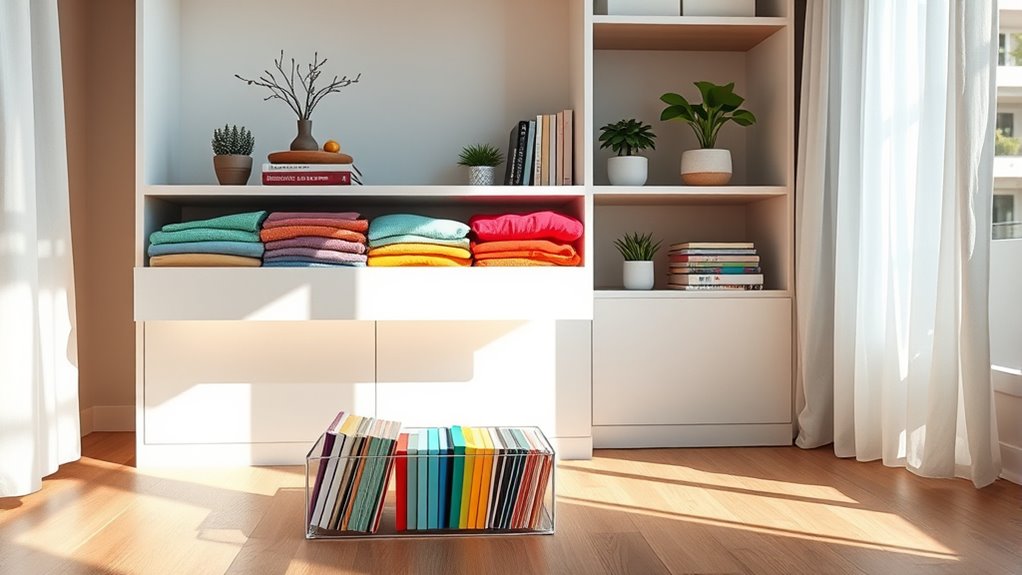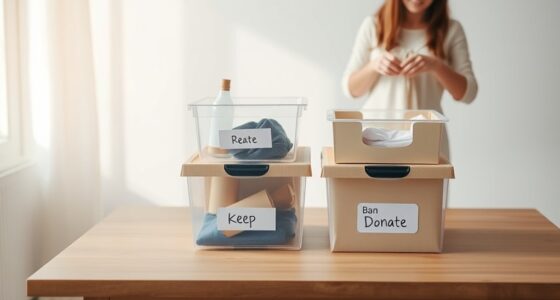You'll never dread decluttering again if you embrace small steps. Start with quick tasks like a single drawer or shelf. Focus on easy items first, such as duplicates or unused utensils. Visual progress can boost your motivation, and involving friends adds accountability. Establish a routine with clear goals to maintain order and reduce waste. Tackling one room at a time keeps overwhelm at bay and creates a fresh space. There's even more to discover about decluttering tips that can make it enjoyable!
Key Takeaways
- Start with small, manageable tasks like a single drawer to make decluttering less overwhelming.
- Involve friends for support and accountability, turning decluttering into a fun social activity.
- Measure your visual progress by taking before and after photos to boost motivation.
- Establish a routine with clear goals, such as reducing waste and implementing the "One In, One Out" rule.
- Focus on one room at a time to maintain clarity and enhance your sense of accomplishment.
Embrace the Power of Small Steps
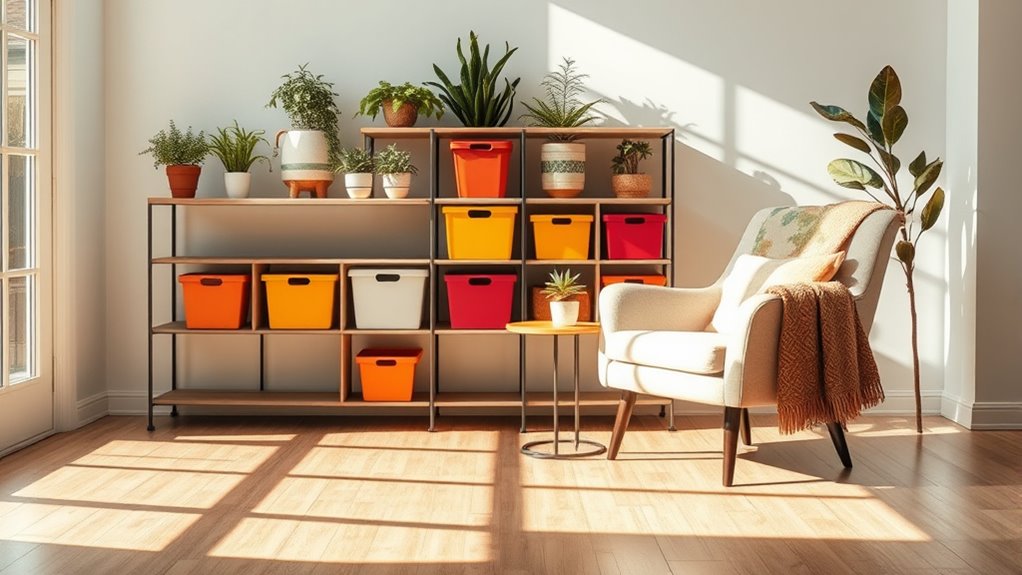
When you embrace the power of small steps, decluttering becomes manageable and less daunting. Start with areas you can tackle in just 10 minutes, like a single drawer or shelf. Break your decluttering into daily tasks, maintaining momentum without feeling overwhelmed. Focus on easy items first, such as duplicates or unused kitchen utensils. Setting up a supportive community can provide motivation and accountability throughout your decluttering journey. Set a timer for short sessions—15 minutes is perfect. Create systems like donation boxes in cluttered areas to encourage gradual progress. Remember, even 2-5 minutes counts! This approach can lead to significant changes, such as eliminating 90% of possessions.
The Impact of Visual Progress
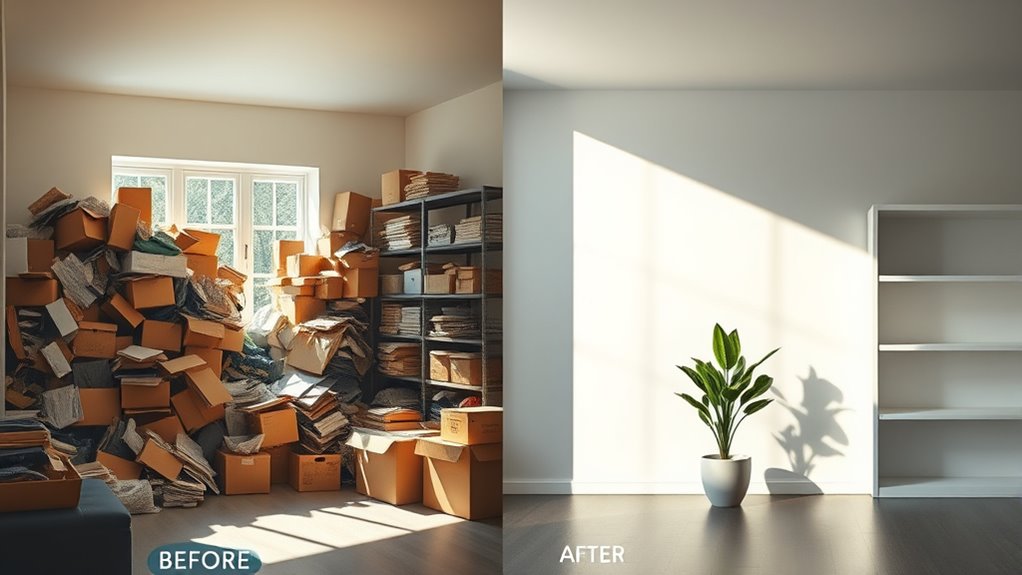
How does visual progress influence your decluttering journey? Seeing the transformation in your space can significantly boost your motivation.
When you clear clutter, you reduce stress and improve your mental health, creating an organized environment that enhances focus and productivity. Visual clutter can overwhelm your senses, making it hard to concentrate. Visual clutter can affect anyone, regardless of minimalism practices, which is why it's essential to address it proactively.
By taking before and after photos or clearing surfaces, you can witness your achievements, which fosters satisfaction. This sense of accomplishment helps you tackle the next area without feeling overwhelmed.
Regularly measuring your progress keeps you committed to maintaining a clutter-free space, ultimately leading to a healthier lifestyle. Embrace the impact of visual progress, and watch your decluttering efforts flourish.
Involve Friends for Extra Motivation
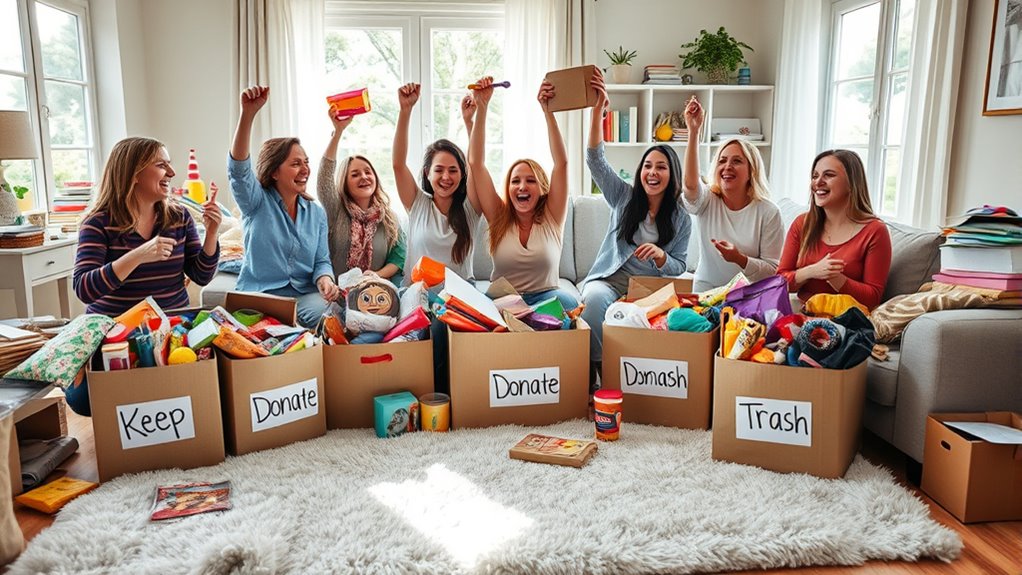
While decluttering can feel overwhelming at times, involving friends can inject fresh energy and motivation into the process. Having accountability partners encourages you to stay on track and complete tasks. Plus, working together makes decluttering fun, turning a chore into a social event. Friends can offer new insights, helping you identify clutter hotspots and brainstorm innovative solutions. Their objective view can provide clarity you might miss on your own. Additionally, the sense of responsibility created by working with friends helps ensure that you stay committed to your decluttering goals.
As you tackle the mess, celebrate small victories together, reinforcing your motivation. The emotional support from friends eases the stress of tough decisions, making the entire experience more enjoyable. Moreover, collaborating with friends can lead to increased productivity as studies show that a tidy environment enhances focus and efficiency.
Establish a Sustainable Routine

Gathering friends for decluttering can be a fun way to kick off the process, but maintaining that momentum is key to creating lasting change. Start by setting clear goals—think about what you want to achieve, like reducing waste or creating more space.
Reflect on your motivations; maybe decluttering will improve your mental health or help you live more sustainably. Energy efficiency evaluations can also guide you in deciding which appliances to keep or replace as you declutter.
Adopt eco-friendly practices: donate items responsibly, recycle properly, and consider upcycling. Embrace the "One In, One Out" rule to maintain a clutter-free space. Regularly review your belongings to prevent accumulation, and prioritize quality over quantity. Lastly, engage with your community through swap parties and local initiatives, fostering a shared commitment to sustainability. Sustainable decluttering not only helps you clear out your space but also benefits the planet by promoting mindful consumption.
This mindful approach will ensure your decluttering efforts are both effective and lasting.
Tackle One Room at a Time
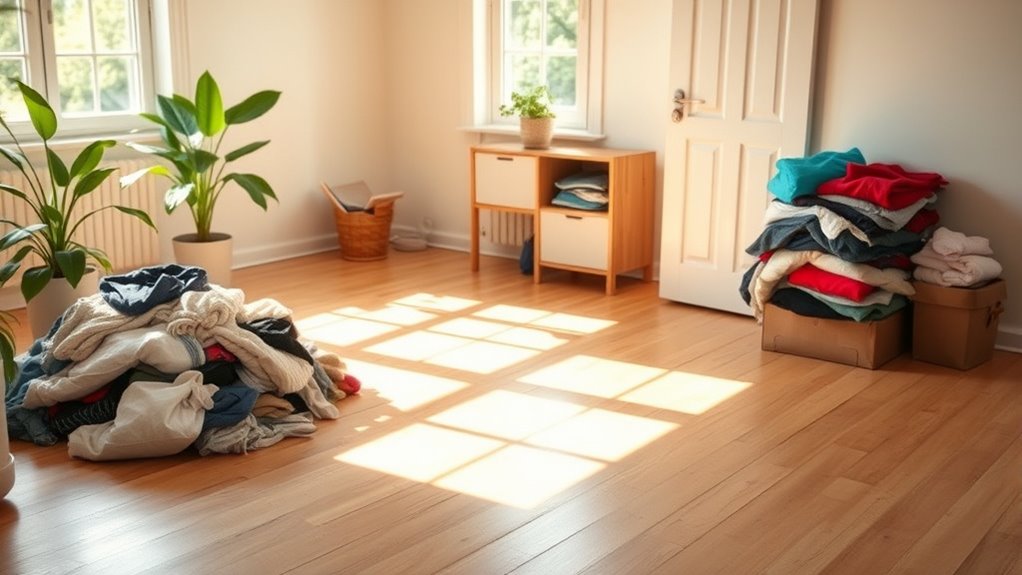
When you tackle one room at a time, you can significantly reduce feelings of overwhelm and make the decluttering process more manageable.
Focus on a single space to enhance efficiency and productivity. Start with a small room to build momentum—remove unnecessary items, and implement storage solutions to keep what you need organized. Creating a sorting system helps categorize items into keep, donate, sell, or discard. Once you've decluttered, clean thoroughly to maintain a fresh environment. This method not only saves time and energy but also fosters a sense of accomplishment that motivates you to continue. Incorporating natural elements into your decor can further enhance the tranquility of your newly organized space.
A well-organized room can improve your focus, reduce stress, and even boost your mood, making each space a joy to use. Additionally, a clean environment contributes to better physical health, ensuring that your decluttered space promotes overall well-being.
Shift Your Mindset for Success

Shifting your mindset is crucial for successful decluttering, as it transforms the way you perceive the process. Instead of viewing decluttering as a loss, see it as an opportunity to create space for what truly matters. Reframe negative thoughts; let go of guilt over past purchases, and focus on the gains you'll achieve. Embrace intentionality by curating belongings that align with your values and goals. Remember that clutter impacts the present; visualize the benefits of your decluttered space to stay motivated. Just like selecting the best global flavors from a diverse menu, break tasks into small steps and celebrate each bit of progress.
Frequently Asked Questions
What Should I Do With Sentimental Items I Can't Part With?
If you can't part with sentimental items, start by acknowledging your feelings.
Try taking photos of each item to preserve the memory without the clutter.
Consider creating a memory box for a few cherished pieces.
You might also display select items in your home to honor their significance.
How Can I Maintain Decluttering Momentum Over Time?
To maintain decluttering momentum over time, focus on establishing daily habits. Spend just 20 minutes each day tidying up, and regularly assess your items using rules like the 90/90 or 20/20 rule.
Create donation boxes in your home as reminders, and seal them up immediately. Visualize your clutter-free space to stay motivated, and celebrate your small wins.
Breaking tasks into manageable steps also helps keep you engaged and moving forward.
What Are Some Eco-Friendly Disposal Methods for Unwanted Items?
When you have unwanted items, consider eco-friendly disposal methods.
First, recycle materials like plastics and metals. If items are in good shape, donate them to local charities or thrift stores.
Upcycling can breathe new life into old possessions, while composting organic waste reduces landfill contributions.
Selling online or hosting a garage sale helps extend item use.
Lastly, check for specialized services that handle electronics and hazardous materials responsibly.
How Do I Handle Clutter From Other Family Members?
Handling clutter from family members can feel like trying to tame a tornado!
Start by assigning personal clutter bins for each person to keep their belongings organized.
Create shared spaces that everyone commits to maintaining.
Encourage daily tidying habits, and schedule regular decluttering sessions as a family.
Teach responsibility by involving kids in the process, making decluttering a fun and cooperative effort.
Together, you'll transform chaos into order in no time!
Can I Declutter Without Feeling Guilty About Giving Away Gifts?
Yes, you can declutter without feeling guilty about giving away gifts.
Start by reframing your mindset; see gifts as gestures of love rather than obligations. Remember, letting go doesn't diminish the sentiment behind them.
Consider donating or regifting items that aren't useful to you but could bring joy to someone else.
Focus on the memories, not the physical objects, and accept that it's okay to free yourself from unwanted items.
Conclusion
By embracing these decluttering strategies, you're not just tidying up your space; you're embarking on a journey akin to Hercules cleaning the Augean stables—transforming chaos into order. Each small step leads to a monumental change, and as you see your progress, motivation blooms. Involving friends turns the task into a shared adventure, and tackling one room at a time makes the challenge manageable. With a renewed mindset, you'll find that decluttering can be both empowering and liberating.
